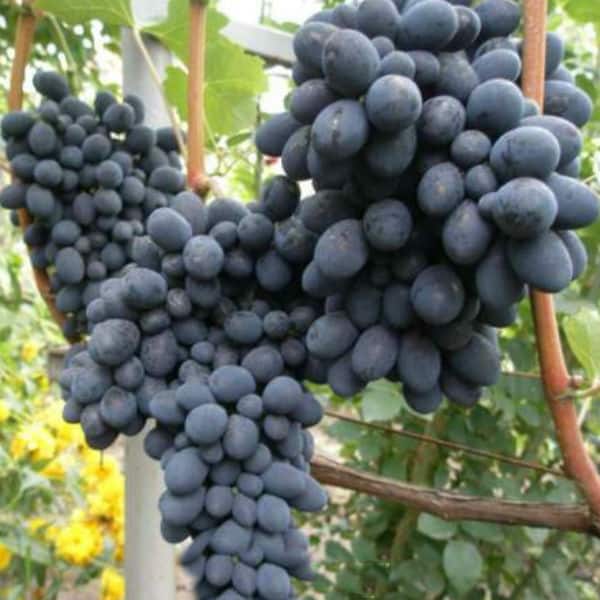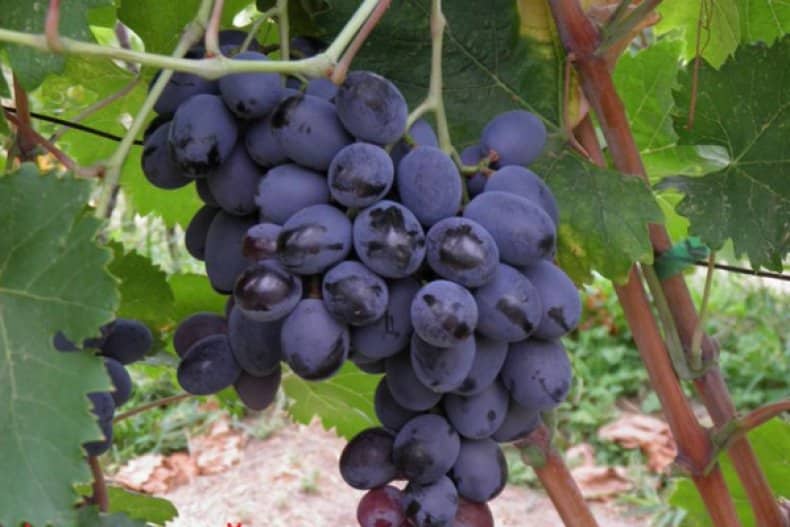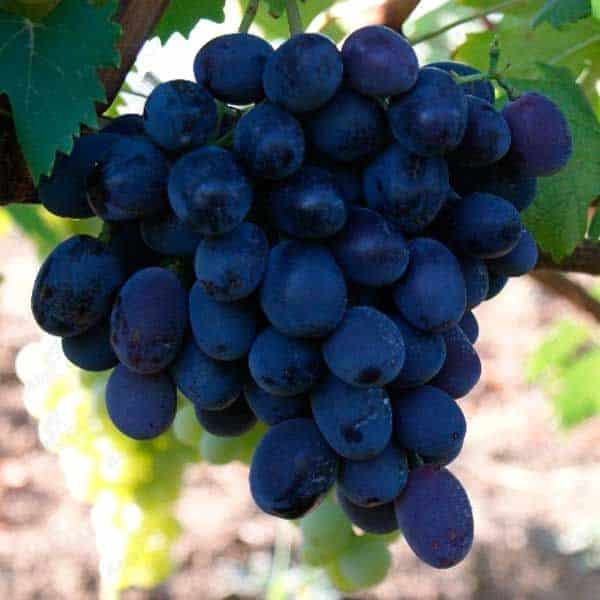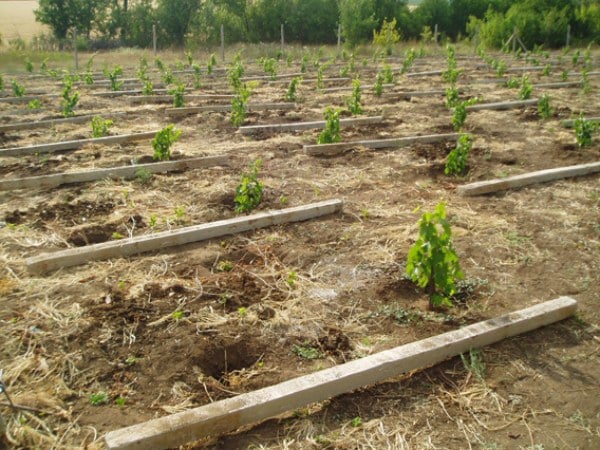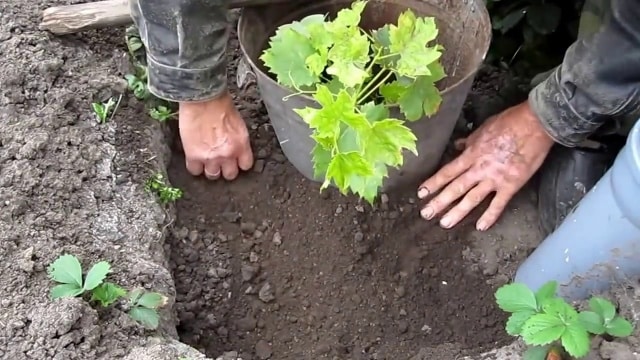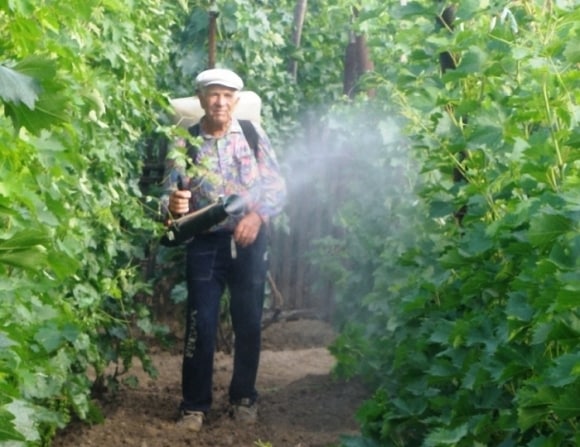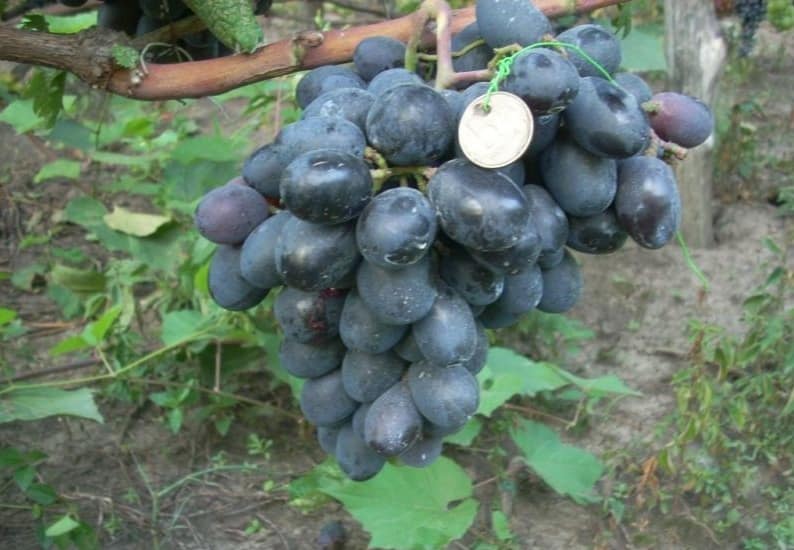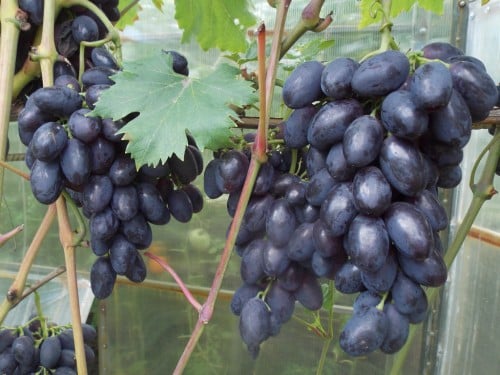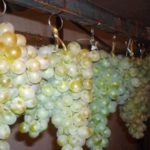Amateur breeder V.V. Zagorulko once again pleased gardeners by presenting to their attention a new hybrid grape variety, Furshetny, intended mainly for cultivation in personal plots. Experienced winegrowers have already appreciated all the advantages and disadvantages. The new product has become a worthy addition to the collection of favorite varieties.
- History of the breeding of the Furshetny hybrid
- Features of the variety
- Advantages
- Flaws
- External characteristics
- Description of the vine and leaves
- Taste and appearance of fruits
- Frost resistance
- Disease resistance
- Methods of propagation of grapes
- Planting scheme
- Best place to drop off
- Requirements for soil
- Depth and width of the pit
- Feeding and watering young seedlings
- Variety care
- Irrigation
- Top dressing
- Formation of the vine
- Treatment
- Mulching
- Fruiting
- Flowering time
- Fruit ripening period
- Harvesting Rules
- Application of berry bunches
History of the breeding of the Furshetny hybrid
The Furshetny grape was bred in the Ukrainian city of Zaporozhye by a famous local breeder. The Kuban varieties and the Gift to Zaporozhye, which he had previously received, were taken as a basis. The new product was presented to consumers in 2008. It combined all the best characteristics of mother varieties and was ideal for summer cottages and garden plots.
Features of the variety
Furshetny, along with many advantages that distinguish it favorably from other similar varieties, also has minor disadvantages.
Advantages
Gardeners have identified the following advantages of this grape:
- increased frost resistance;
- the crop is suitable for long-term storage;
- suitability for transportation over long distances without loss of taste and commercial qualities;
- excellent taste of ripe fruits;
- strong aroma;
- bisexual flowering;
- high productivity;
- the vine ripens along its entire length;
- increased resistance to disease.
Flaws
No significant shortcomings were identified in the Furshet grapes, but some gardeners noted that if rationing is not carried out, the bushes are prone to overload with the harvest. In the future, this negatively affects the condition of the plant.
External characteristics
Furshetny has its own distinctive features, thanks to which it can be identified among similar varieties.
Description of the vine and leaves
The grape bush is vigorous and branched, the intensity of shoot formation is strong. The root system of Furshetny is highly developed.The leaves of this variety are bright green, curly in shape, and quite wide. The plant does not require planting a pollinator variety nearby, since the flowering is bisexual.
Taste and appearance of fruits
The grape clusters are formed in a conical shape, weighing on average 600-900 g. The fruits are large, grow densely, and have an oblong shape. At the stage of technical ripeness they acquire a dark blue or purple color. Due to the presence of a thin but very dense skin with a slight waxy coating, the transportability of the berries increases. The pulp is very aromatic and juicy. Furshetny has a rich, sweet, very pleasant taste.
The aroma is strong. In the aftertaste, the fruits are often compared to raisins or mulberries. Each berry reaches a mass of 9-13 g.
Frost resistance
Furshetny grapes have increased frost resistance and are able to withstand temperatures down to -22 °C in winter.
Disease resistance
The Furshetny grape variety has increased resistance to common diseases, but still requires mandatory preventive treatments against mildew, anthracnose, alternaria, and oidium.
Methods of propagation of grapes
The variety is a hybrid, therefore it cannot be propagated by seeds, except for use as a rootstock. To propagate bushes, cuttings and layering are used.
Planting scheme
Furshetny grapes are a vigorous variety, so planting them cannot be done in dense areas. The ideal option would be to plant bushes in a 3 x 3 meter pattern.
Best place to drop off
It is best to plant a grapevine in an area free from other plants. It should be well lit, provide good access to sunlight, heat and air permeability.
Requirements for soil
For planting, buffet grapes prefer black soil or loamy and sandy loam soil, but they will not grow in salt marshes and wetlands. If the groundwater level is high, it will be necessary to carry out careful drainage, and in some cases raise the vineyards slightly. The land must have a sufficient supply of nutrients; if it is depleted, then the necessary fertilizers are applied.
Depth and width of the pit
The depth and width of the hole for planting grapes must be at least 80 cm, of which 10 cm is occupied by the drainage layer.
Feeding and watering young seedlings
After planting the Buffet grapes, 2 buckets of water must be added to the plot for each seedling. Seedlings are fed in autumn and spring, adding organic matter and complex mineral fertilizers.
Variety care
The matter is not limited to just planting the vine; to obtain stable and abundant harvests, the grapes require proper care.
Irrigation
In dry years, Furshetny grapes need regular watering, otherwise you won’t be able to get tasty and juicy berries. The irrigation system must be thought out before planting, because it is advisable to do this not at the root, but in a ditch dug nearby. An installed drip irrigation system is also suitable.
Mature grape bushes are irrigated several times a season. This is done for the first time in the spring, if there is not enough melt water and the soil is dry. Then before flowering begins, after it ends and before the harvest begins to ripen.
Top dressing
Grapes are fed with both organic and chemical mineral preparations. Before winter, manure is added, and in the spring, any humus and wood ash are added. Along with standard products, foliar feeding is also used. Spraying is carried out three times during the growing season.
Formation of the vine
The formation of the Furshetny variety grapevine is carried out from the second year of life. Work is carried out before the start of sap flow in plants or after the leaves fall. Branches are pruned into 8 eyes, and no more than 30 shoots are left on one bush. The trimmed vine can be used for further propagation.
Treatment
Despite the increased resistance of Furchette grapes to fungal diseases, it requires preventive treatments with fungicides. To prevent the appearance of garden pests in the vineyard, it is sprayed with insecticides. Use them according to the instructions included with the specific product.
Mulching
To prevent excessive evaporation of moisture, it is advisable to mulch the vineyards. For this purpose, harvested hay, harvested and dried weeds from the site, sawdust, straw, and pine needles are used. It is important that the selected material itself does not become a source of plant infection with fungi and other dangerous diseases.
Fruiting
The Furshetny grape bears fruit abundantly, and if this parameter is not normalized, the bush may become overloaded with tassels, which does not have a very good effect on the future condition of the plant.
Flowering time
Furshetny grapes begin to bloom when the outside temperature reaches an acceptable temperature (at least +25 °C). Otherwise, the inflorescences will not be pollinated. As a rule, this time falls in mid-May - early June, but it may vary depending on the region.
Fruit ripening period
Buffet grapes, depending on the growing region, can be classified as mid-early or early varieties. Its fruits ripen within 110-135 days after flowering. In the middle zone this time falls in mid-August.
Harvesting Rules
It is preferable to harvest Furchette grapes in dry and clear weather. The branches are carefully cut from the bush and placed in a basket, after which they are sent for sorting. Dry, spoiled and overripe brushes are set aside separately.
Application of berry bunches
Furshetny grape berries have universal use. They are used both for fresh consumption and for all types of processing, making homemade wine, and freezing. The juicy and sweet fruits make excellent juice. They are used in dietary and therapeutic nutrition.

